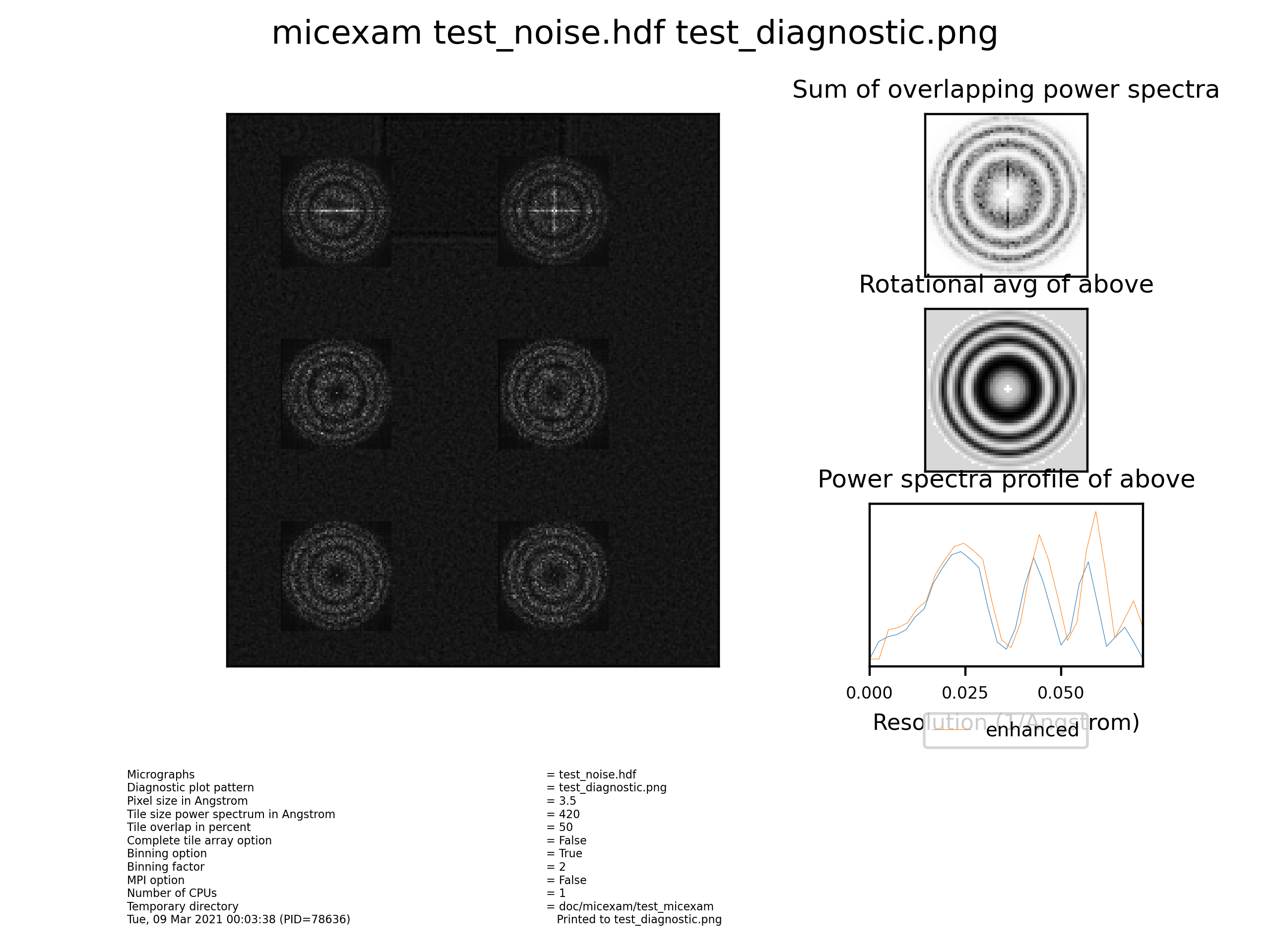Micexam¶
Program to examine micrograph quality by computing a localized power spectrum using EMAN2’s e2scaneval.py and an averaged power spectrum from overlapping tiles using SPARX’ sx_welch_pw2.py
Parameters¶
Parameter |
Example (default) |
Description |
|---|---|---|
Micrographs |
cs_scan034.tif |
Input micrographs: accepted file formats (tif, .mrc, .mrcs, .spi, .hdf, .img, .hed). |
Diagnostic plot pattern |
micexam_diag.pdf |
If single input micrograph: name of diagnostic plot file. In case of multiple input micrographs suffix to be attached to corresponding input micrograph. Output: accepted file formats (pdf, .png, .bmp, .emf, .eps, .gif, .jpeg, .jpg, .ps, .raw, .rgba, .svg, .svgz, .tif, .tiff). |
Pixel size in Angstrom |
1.163 |
Pixel size is an imaging parameter (accepted values min=0.001, max=100). |
Sample parameter file¶
You may run the program in the command line by providing the parameters via a text file:
micexam --f parameterfile.txt
Where the format of the parameters is:
Micrographs = cs_scan034.tif
Diagnostic plot pattern = micexam_diag.pdf
Pixel size in Angstrom = 1.163
Additional parameters (intermediate level)¶
Parameter |
Example (default) |
Description |
|---|---|---|
Binning option |
True |
Micrograph is reduced in size by binning. |
Binning factor |
3 |
Micrograph is reduced in size by binning factor (accepted values min=1, max=20). |
MPI option |
True |
OpenMPI installed (mpirun). |
Number of CPUs |
2 |
Number of processors to be used. Maximum number corresponds directly to number of input scans, i.e. no gain in performance if single input micrograph chosen (accepted values min=1, max=300). |
Temporary directory |
/tmp |
Temporary directory should have fast read and write access. |
Sample parameter file (intermediate level)¶
You may run the program in the command line by providing the parameters via a text file:
micexam --f parameterfile.txt
Where the format of the parameters is:
Micrographs = cs_scan034.tif
Diagnostic plot pattern = micexam_diag.pdf
Pixel size in Angstrom = 1.163
Binning option = True
Binning factor = 3
MPI option = True
Number of CPUs = 2
Temporary directory = /tmp
Additional parameters (expert level)¶
Parameter |
Example (default) |
Description |
|---|---|---|
Tile size power spectrum in Angstrom |
1800 |
Tile size to be used for analysis (accepted values min=1, max=10000). |
Tile overlap in percent |
50 |
Overlap influences degree of averaging (accepted values min=0, max=90). |
Complete tile array option |
False |
A complete array of tiles with no gaps will be generated across the micrograph |
Sample parameter file (expert level)¶
You may run the program in the command line by providing the parameters via a text file:
micexam --f parameterfile.txt
Where the format of the parameters is:
Micrographs = cs_scan034.tif
Diagnostic plot pattern = micexam_diag.pdf
Pixel size in Angstrom = 1.163
Tile size power spectrum in Angstrom = 1800
Tile overlap in percent = 50
Complete tile array option = False
Binning option = True
Binning factor = 3
MPI option = True
Number of CPUs = 2
Temporary directory = /tmp
Command line options¶
When invoking micexam, you may specify any of these options:
usage: micexam [-h] [--g] [--p] [--f FILENAME] [--c] [--l LOGFILENAME] [--d DIRECTORY_NAME] [--version] [--complete_tile_array_option]
[--binning_option] [--mpi_option]
[input_output [input_output ...]]
Program to examine micrograph quality by computing a localized power spectrum using EMAN2's e2scaneval.py and an averaged power spectrum from
overlapping tiles using SPARX' sx_welch_pw2.py
positional arguments:
input_output Input and output files
optional arguments:
-h, --help show this help message and exit
--g, --GUI GUI option: read input parameters from GUI
--p, --promptuser Prompt user option: read input parameters from prompt
--f FILENAME, --parameterfile FILENAME
File option: read input parameters from FILENAME
--c, --cmd Command line parameter option: read only boolean input parameters from command line and all other parameters will be assigned
from other sources
--l LOGFILENAME, --logfile LOGFILENAME
Output logfile name as specified
--d DIRECTORY_NAME, --directory DIRECTORY_NAME
Output directory name as specified
--version show program's version number and exit
--complete_tile_array_option, --com
A complete array of tiles with no gaps will be generated across the micrograph (default: False)
--binning_option, --bin
Micrograph is reduced in size by binning. (default: False)
--mpi_option, --mpi OpenMPI installed (mpirun). (default: False)
Program flow¶
readmic: Read input micrograph
e2scaneval: e2scaneval.py computes local powerspectra across micrograph
computepower: Compute powerspectrum of overlapping tiles
visualize_power: Visualize powerspectrum


